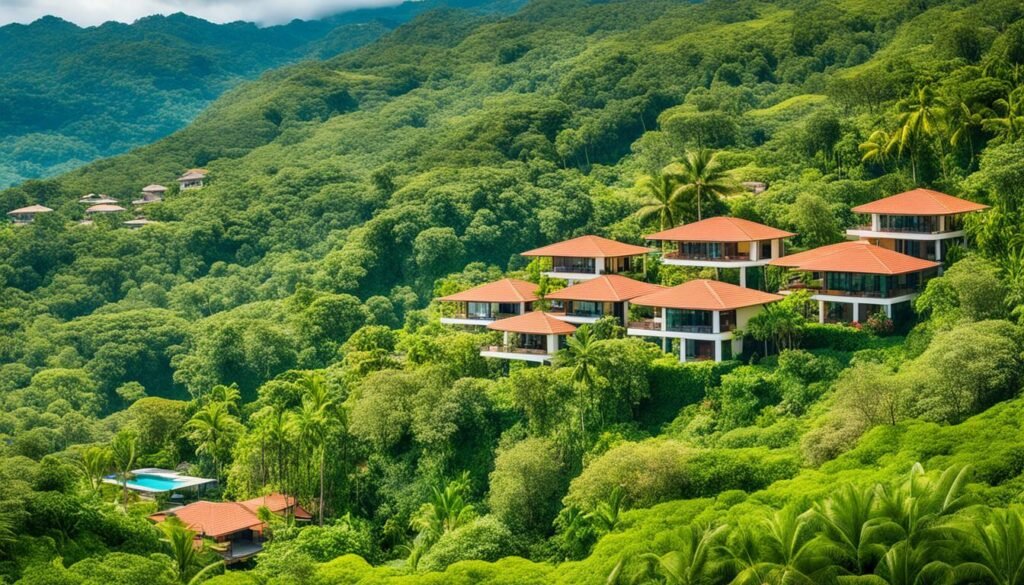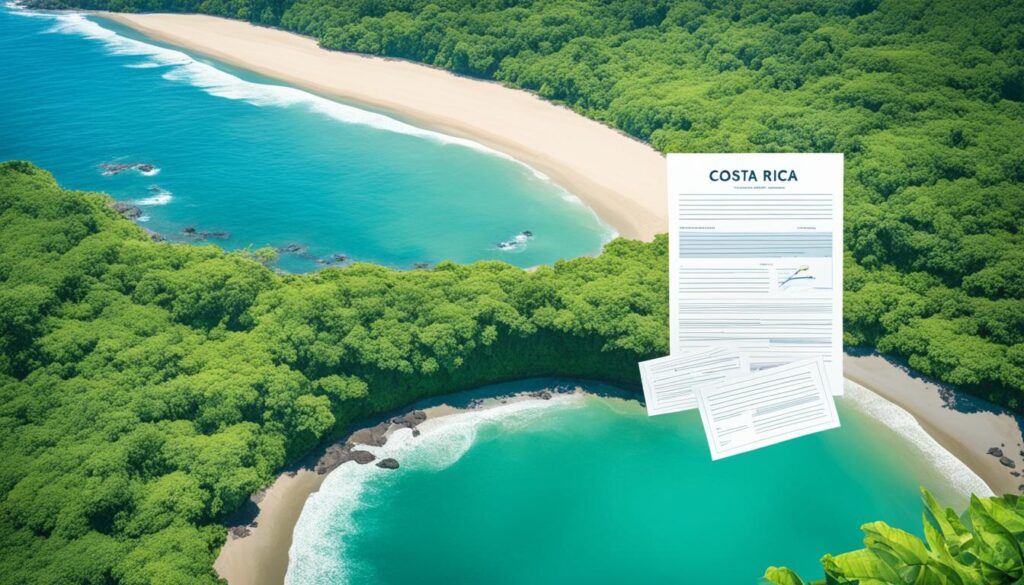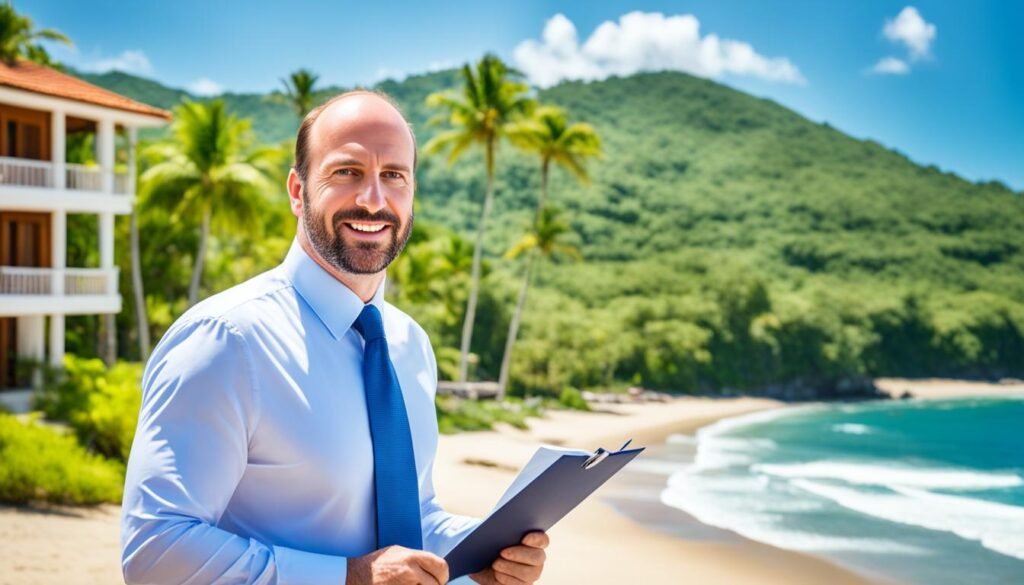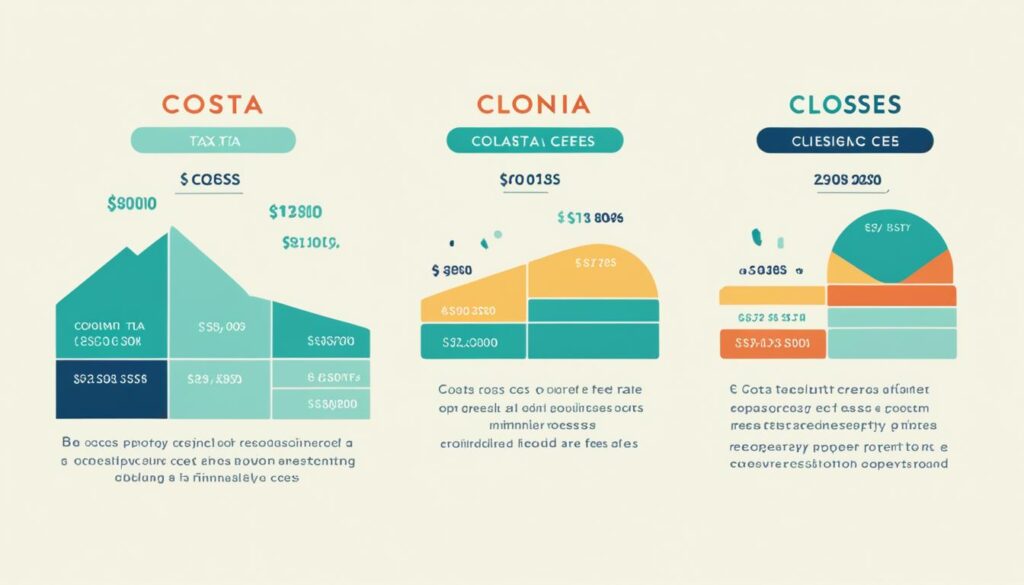With its tantalizing beaches and resplendent rainforests, Costa Rica is an increasingly popular destination, not just for tourists but also for individuals looking to invest in real estate. The Costa Rican market is warm to foreign investors; whether non-residents or those considering relocation, foreigners are endowed with the same rights in purchasing and owning real estate as citizens, fostering a dynamic environment for investing in Costa Rica real estate as a foreigner12. However, meticulous attention to detail is required when navigating the realm of foreign ownership of real estate in Costa Rica, particularly regarding Maritime Zone properties where complete ownership is not always attainable1. Balancing affordability with the allure of the tropics, purchasing property as a foreigner in Costa Rica presents an equitable blend of opportunity and regulation, ensuring that property ownership rules in Costa Rica for foreigners are transparent and fair.
Key Takeaways
- Foreigners enjoy the same real estate ownership rights as Costa Rican citizens without needing residency12.
- Due diligence is key in verifying land titles and existing liabilities to secure a solid investment2.
- Real estate transactions may involve additional costs like transfer taxes and legal fees1.
- Non-citizens face certain constraints concerning properties within Maritime Zones and INDER1.
- Utilizing an escrow service during property transactions contributes to a secure exchange for all parties involved2.
- Condominiums and gated communities might incur additional fees, relevant to those considering such property types1.
- Annual property taxes are notably low, establishing Costa Rica as a financially attractive real estate market2.
Overview of Foreign Ownership in Costa Rica
With its picturesque landscapes and stable economy, Costa Rica is more than just a tropical paradise for tourists— it’s also a prominent destination for international real estate investors. The allure of foreign ownership of real estate in Costa Rica is evident not just in the scenic beauty of the country but in the compelling investment data. The robust foreign direct investment inflow, which was estimated at USD 3.045 billion in 2022, echoes the country’s economic vibrancy and the confidence that the international community places in its market3. Coupled with a property rights for foreigners in Costa Rica system that mirrors the equitable framework of locals, the nation’s real estate terrain is uniquely poised for foreign investment.
Equal Rights for Foreigners and Locals
One of the key factors that draw international buyers to Costa Rican shores is the absence of discrimination in property rights. Indeed, the benefits of buying property in Costa Rica as a foreigner are manifold, with the same entitlements as citizens providing a fair and unobstructed path to ownership. Such egalitarian policies not only foster inclusivity but also help fuel the country’s economy, showcased by the 4.3% GDP growth in 20223. Costa Rica’s legal framework gives a comforting assurance to international buyers that their investments are on par with domestic stakeholders.
The Attraction of Costa Rica for Expats
The idyllic tapestry of Costa Rica’s landscape is matched by its attractive economic indicators. A case in point is the tourism sector— with total tourist arrivals in 2022 reaching nearly three-quarters of the pre-pandemic high3, signifying a resurgent interest in the country’s rich biodiversity and hospitable community. Additionally, the benefits of buying property in Costa Rica as a foreigner extends beyond economics to encompass lifestyle factors. Expatriates often cite the country’s year-round temperate climate, affordable healthcare, and the welcoming arms of vibrant expat communities as reasons to call Costa Rica home.
Legal Protections for International Buyers
For international investors, legal securities remain paramount. Fortunately, legal protections for international buyers in Costa Rica are robust, ensuring that their interests are shielded in the property market. Sound investment climates—such as the one detailed by The U.S. State Department’s Investment Climate Statements—reflect the country’s commitment to upholding a transparent and equitable environment for investors. Costa Rica’s consistent improvement on global indices, such as its score on the corruption perceptions index and its rank in the Global Innovation Index in 20223, further solidifies the investor confidence that feeds into its real estate sector.
Collectively, these factors deliver a message that the foreign ownership of real estate in Costa Rica is not just feasible, but is encouraged and supported by a framework designed to nurture and protect investments. Combined with the vivacious culture and inherent beauty, the nation stands as an inviting horizon for those seeking to broaden their real estate portfolios internationally.
Understanding the Costa Rican Real Estate Market

Navigating the Costa Rican real estate market requires an understanding of its unique structure—a structure that presents specific challenges to those accustomed to the systems in place in countries like the United States and Canada. The absence of a centralized MLS system in Costa Rica presents one such challenge, significantly altering the approach needed for finding property in Costa Rica.
Challenges of No MLS System
Without a standardized MLS system in Costa Rica, buyers face the reality that traditional listings in Costa Rica real estate are not as accessible. This can make comprehensive market comparisons more challenging, as collecting data about available properties requires more effort and sources than it might in other countries. The challenges of buying property in Costa Rica, therefore, often involve piecing together information from various agents and listings to get a full picture of the market.
Finding the Perfect Property Without Traditional Listings
Finding the ideal property means understanding the localized nature of real estate transactions in this vibrant market. With the GDP per capita indicator suggesting that Costa Rican people have become 7.2% richer over the last five years4, the demand within the Costa Rican real estate market has been steadily rising. This increasing affluence, paired with the absence of an MLS system in Costa Rica, enhances the crucial role of reputable real estate agents who bridge the gap for investors.
In such a fragmented market landscape, knowing the average price per square meter in different regions becomes invaluable. For instance, San José, the national capital, offers property prices that range between USD 1,500 – 3,500 per sqm4. Contrastingly, the more upscale neighborhood of Escazú displays a price range of USD 2,500 – 4,500 per sqm4. Popular beach destinations such as Tamarindo and Jaco list their average prices per sqm at USD 2,000 – 4,000 and USD 1,500 – 3,500 respectively4, while for the unparalleled natural beauty of Manuel Antonio, prices can escalate to between USD 3,000 – 6,000 per sqm4.
To further illustrate the variation, consider La Fortuna, known for its proximity to Arenal Volcano, and Guanacaste with its beautiful beaches; these regions show an enticing average price per sqm between USD 1,500 – 3,000 and USD 1,000 – 3,000 respectively4. Additionally, gross rental yields in Costa Rica are commendable, ranging from 5.3% to 8.0%4, suggesting that investment properties could also provide a steady income for owners.
| Location | Average Price per Sqm (USD) | Gross Rental Yield (%) |
|---|---|---|
| San José | 1,500 – 3,500 | 5.3 – 8.0 |
| Escazú | 2,500 – 4,500 | |
| Tamarindo | 2,000 – 4,000 | |
| Jaco | 1,500 – 3,500 |
These data points, alongside the expertise of local professionals, can dramatically streamline the process of finding property in Costa Rica. Therefore, while the challenges of buying property in Costa Rica are real, they are not insurmountable. With thorough research, the assistance of knowledgeable agents, and an appreciation for the distinctive qualities of the market, prospective buyers can successfully navigate the enticing terrain of Costa Rican real estate.
The Legal Process of Purchasing Property

Embarking on the legal process of buying property in Costa Rica commences with recognizing the land types available. Three principal categories, namely titled, concession, and maritime zone, compose the spectrum of property one can purchase5. The journey towards ownership must respect the limitation where the initial 50 meters from the high tide mark, deemed public land, are off the table for private use, while the adjacent 150 meters, allocated as concession land, offer unique opportunities with distinct stipulations5.
Understanding the legalities and steps to purchase property in Costa Rica is pivotal. The Registro Nacional plays an integral role, preserving meticulous records of property ownership that can verify the status and legitimacy of any premises in question5. Armed with the assurance that the Costa Rican Constitution upholds property rights for all individuals, irrespective of nationality, the procedure unfolds with a transparent roadmap for both citizens and foreigners5.
Yet, it’s critical to recognize that taxes and fees—including transfer taxes, property taxes, and notary fees—are inherent to the property purchase process in Costa Rica. These expenses, often overlooked in initial budgeting, perform as the silent keystones in the grand arc of acquisition5. Moreover, strict laws safeguarding the country’s natural resources may shape property development, underscoring the importance of due diligence and professional guidance5.
For foreign investors, awareness about restrictions in sectors like telecommunications and transportation is essential as they may encounter limitations not applied to nationals5. Hence, consulting with a bilingual real estate attorney—who is also a public notary in Costa Rica—can facilitate navigation through these complexities, ensuring all legal stipulations are met, and the process remains above board.
- Find a suitable property respecting the maritime zone regulations.
- Make an offer with clarity on public versus concession land.
- Create a purchase-sale agreement in line with national and foreign ownership rights.
- Execute due diligence, including a comprehensive review of the Registro Nacional records.
- Complete the closing process, keeping in mind all relevant taxes and legal constraints.
By stitching together each phase meticulously, the tapestry of property ownership in this lush nation can be a seamless panorama of legal integrity and personal satisfaction.
| Type of Property | Ownership Rights | Key Considerations |
|---|---|---|
| Titled | Protected by Constitution5 | Standard purchase, full ownership |
| Maritime Zone (concession) | Restricted5 | Concession rules, environmental laws5 |
| Public Land (first 50m) | Not applicable5 | Cannot be owned, public use only5 |
Benefits of Hiring a Real Estate Attorney

Navigating a foreign real estate market can be complex, but the benefits of hiring a real estate attorney in Costa Rica are manifold. A bilingual attorney is invaluable for legal representation in Costa Rican real estate transactions, offering clarity and legal certainty to the process.
The Role of a Bilingual Attorney in Property Purchase
A bilingual attorney bridges the language and legal culture gap, ensuring that all parties are on the same page throughout the sales process. They can provide comprehensive guidance, from reviewing contracts to ensuring that local regulations and procedures are correctly followed. By leveraging their expertise, you can avoid the common pitfalls that may befall those unfamiliar with Costa Rican law.
Belgium’s successful real estate market demands a ten-year renewal of real estate licenses to maintain a stable and well-regulated environmentreal estate practices around the world, similar to the rigorous standards that an experienced Costa Rican attorney would adhere to6.
Why You Need a Notary Public in Costa Rica
In Costa Rica, the importance of a notary public cannot be overstated. As the only professionals authorized to record property purchases in the National Registry, their role is critical. They confirm the identity of the parties, certify the integrity of the transaction, and help to prevent future legal disputes. Essentially, without their stamp of approval, a property sale or purchase holds no legal weight.
The intricate web of real estate laws in countries like Belarus, where commission fees are paid by either party involved in the transaction to the real estate agency6, illustrates the importance of having skilled legal representation in any property deal. A Costa Rican real estate attorney and notary public serve a similar, crucial role by ensuring transactions are legally sound and in full compliance with Costa Rican law.
Whether you are a local or a foreign investor, hiring a legal expert offers peace of mind and signifies a commitment to due diligence. Embracing the benefits of hiring a real estate attorney in Costa Rica and acknowledging the essential nature of a notary public in the purchase process safeguards your real estate investments, paving the way for smooth and secure transactions.
Can Foreigners Buy Property in Costa Rica

With its idyllic landscapes and favorable climate, Costa Rica is an attractive destination for international investors and retirees. A key question that arises is: Can foreigners buy property in Costa Rica? The answer is a resounding yes. Foreigners enjoy the same property ownership rights as Costa Rican citizens7, allowing for the purchase of titled land in their own names without the need for residency or citizenship8. Nevertheless, knowledge of real estate regulations for non-residents in Costa Rica is crucial to navigate the market effectively9.
It’s important to understand that while most of the land in Costa Rica falls under titled property, some fall into the category of untitled property, where legitimate possession rights can be claimed after a minimum of 10 years of legal possession7. For those keen on owning property near the crystal-clear waters, Costa Rica offers the opportunity through the Maritime Zone. Governed by the Maritime Zone Law of 1977, the first 50 meters from the high tide line are deemed public land, while the subsequent 150 meters can be granted for private development through a concession application, registered with the local Municipality7.
The allure of Costa Rica’s real estate has been reflected in market trends, with a steep rise in property prices, especially larger and beachfront properties, due to the global pandemic’s impact. The attraction is also numerically evident – in 2017 alone, foreigners bought properties worth $2.4 billion, marking a 26% hike from the previous year8. Moreover, Americans face minimal restrictions, able to purchase most properties without limits, except within the Maritime Zones where more nuanced regulations apply9.
For potential buyers, understanding the fiscal aspects of property transactions in this tropical paradise is crucial. From real estate transfer tax to notary fees, a range of costs come into play. To assist buyers in navigating these expenses, the following table breaks down the key costs involved in the process:
| Expense | Percentage/Cost |
|---|---|
| Real Estate Transfer Tax | 0.75% |
| Documentary Stamp | 0.18% |
| Notary Fees | 0.5% – 1% |
| Residential Property Register Stamp | 0.45% |
| Real Estate Agent Fee | 2.5% – 5% |
Understanding these costs is just as important as recognizing the potential of investing in a place ranked second-best globally for retirement in 2022 by Forbes8. The high demand in tourist hotspots like Playa Flamingo and Playa Tamarindo, where foreigners are permitted to buy beachfront properties without the need to split ownership, underscores the prevailing interest in Costa Rican shores8.
Entering the Costa Rican real estate landscape necessitates a careful approach. Buyers should work with reputable and licensed real estate agents to lead the process smoothly and safeguard their investments. As real estate transactions are typically carried out locally, this becomes an integral aspect of the purchase journey8.
Ultimately, the dream of owning property in Costa Rica is well within reach for foreigners. With a grasp on property ownership rules for foreigners in Costa Rica and attentiveness to the legalities and financial responsibilities, investors can join the growing community of international residents calling Costa Rica their home or their escape.
Navigating the Purchase Process for Non-Residents

For non-residents eyeing the lush landscapes and tranquil shores of Costa Rica, the dream of owning property is well within reach. An in-depth understanding of the local real estate protocol is crucial to a successful transaction, especially when it comes to crafting the offer and sale agreement and comprehending the escrow and closing procedures in Costa Rica. These processes may be notably different from those in other countries.
Structuring the Offer and Sale Agreement
Embarking on the journey to purchase Costa Rican real estate begins with an offer and sale agreement. Foreigners in Costa Rica enjoy the same purchasing rights as citizens, sans the ability to vote10. This is a significant encouragement for non-residents buying property in Costa Rica, as they can engage in the property market with confidence. A widespread practice during this initial phase is to deposit 10% of the property’s asking price into an escrow account as a demonstration of good faith10. Securing the services of a bilingual real estate attorney at this juncture is highly recommended to oversee the purchase process, ensuring language barriers do not lead to misunderstandings or legal complications10.
Understanding Escrow and Closing Procedures
Come closing time, non-residents must be well-acquainted with the escrow and closing procedures in Costa Rica. Unlike some regions, titled property in Costa Rica is classified as land situated more than 200 meters from high tide, with the first 50 meters being public land and the subsequent 150 meters designated as the Maritime Zone, which is leased from the government10. The purchase process for foreigners in Costa Rica often culminates with the registration of the property in the buyer’s name or a corporation if they are not available to attend in person, with a power of attorney granted to a legal representative10. It’s paramount for buyers to consider all associated fees, including utilities, condominium fees, corporation tax, and property tax when budgeting for their investment10.
An essential step in the process is engaging with a dependable and seasoned real estate agent who can offer personalized attention and navigate the intricacies of the Costa Rican real estate market10. Furthermore, understanding the importance of a transparent and seamless transaction cannot be overstated—a vital component of which is expert guidance during escrow and closing. To learn more about the nuances of real estate transactions in this paradise, one should explore the extensive information available on the purchase process for foreigners in Costa Rica.
Financial Considerations: Costs and Taxes

For foreigners eyeing the idyllic landscapes of Costa Rica for property investment, it’s crucial to delve into the financial aspects that accompany the picturesque views. Acquiring real estate in this tropical paradise involves certain costs and taxes that impact the overall investment.
Breaking Down Closing Costs
Closing costs in Costa Rican real estate are multifaceted, needing careful consideration to ensure budgeting accuracy. The legal landscape here mandates 1.25% of the transaction value as attorney fees and approximately 2.5% in government stamps and fees when the property is purchased directly in the buyer’s name or through a corporationfinancial considerations for foreigners buying property in Costa Rica11. Furthermore, share transfer transactions attract 1.5% in similar government stamps and fees, not forgetting the escrow fees that also come into play11. Title insurance and escrow services, provided by firms like Chicago Title and First Costa Rican Title Company, typically have fees around 1% or lower, adding another layer to the costs of buying property in Costa Rica11.
Calculating Property Tax and Luxury Tax in Costa Rica
Once the joy of acquiring a slice of paradise in Costa Rica sets in, ongoing expenses follow; property tax in Costa Rica is a recurring cost for real estate owners. This tax is notably low, sitting around 0.25% of the registered property value, which is a relief for many investors11. Those who have invested in high-end properties must also be aware of the luxury tax in Costa Rica, which fluctuates between 0.1% and 0.25% and is determined by attributes such as size and features of the property11. It’s essential for property investors to factor in these additional financial obligations for comprehensive financial considerations for foreigners buying property in Costa Rica11.
Registering and Protecting Your Real Estate Investment
When it comes to safeguarding your assets in Costa Rica, understanding the nuances of registering property in Costa Rica and protecting real estate investment is paramount. With a landscape that offers over 19,700 square miles of biodiversity and a multitude of microclimates, from sunny beaches to tropical forests12, it’s crucial to navigate the process with due diligence and adherence to legal protocols. In fact, about 90% of Costa Rican properties are titled—suggesting a well-established framework for the transfer of title in Costa Rican real estate12.
Choosing between Private Ownership and Corporate Entities
Deciding between private ownership and housing your investment in corporate entities requires weighing several factors. On the one hand, owning property under your name in Costa Rica could avail you of certain capital gains tax exemptions if it’s your primary residence13. Conversely, establishing a corporate entity to hold your property, such as a Sociedad Anónima or a Sociedad de Responsabilidad Limitada, provides personal asset protection and may come with benefits for estate planning and tax management13. While private ownership can offer cost savings, corporate ownership can simplify banking processes and grant legal shields for your personal assets13.
Ensuring Clear Transfer of Title
In the realm of Costa Rican real estate, securing a clear transfer of title is non-negotiable. It’s a step that ensures you’re legitimately registering property in Costa Rica while maintaining compliance with the country’s zoning laws and environmental regulations, which are particularly stringent near protected areas5. The Maritime Zone Law, governing properties near the coast, dictates stringent ownership conditions within the initial 200 meters from the high tide line, complicating transfer of title for these prized locations5. Foreign investors should also note that certain sectors, like telecommunications, have ownership restrictions5.
To navigate this complex legal terrain and assure the protection of your investment, it’s essential to resolve all taxes and fees associated with buying property—including transfer taxes, notary fees, and registration fees—prior to the title change registration in the National Registry of Costa Rica12.
The Unique Aspects of Maritime Zone Property
Understanding the guidelines for Maritime Zone property in Costa Rica is crucial for anyone interested in buying property near the beach in Costa Rica. The country’s coastline is governed by specific laws designed to protect its natural beauty while allowing for responsible development. The maritime terrestrial area includes a 200-meter zone measured from the high tide line, delineating a public space of the first 50 meters and a restricted area for the subsequent 150 meters14.
Navigating Ownership Restrictions Near the Coast
It is essential for prospective investors to be aware of the ownership restrictions near the coast. They range from absolute prohibitions to regulated concession agreements. Foreign nationals, corporations with bearer shares, or entities with a majority foreign ownership, as well as companies not domiciled in Costa Rica, face restrictions, as they are not allowed to obtain concessions within the Maritime Zone unless they have legally resided in Costa Rica for at least five years14. This necessitates strategic planning and, often, the formation of a partnership with Costa Rican nationals or entities.
Types of Titled and Concession Land
Understanding the difference between titled land vs concession land in Costa Rica is pivotal for any investment. Titled land is privately owned with fewer restrictions, whereas concession land involves a lease agreement with the government, typically ranging between 5 to 20 years14. These contracts require compliance guarantees and are subject to strict zoning regulations and required approvals from both the Municipality and the Costa Rican Tourism Institute for any modifications14. Due diligence in ensuring the adequacy of public services and clearing any pending obligations is fundamental, as these factors directly impact the progress and approval of development projects14.
| Factor | Titled Land | Maritime Zone Concession Land |
|---|---|---|
| Ownership | Private | Leased from government |
| Term | Permanent | 5 to 20 years14 |
| Investment Structure | Flexible | At least 50% shares held by Costa Ricans for hotels14 |
| Zoning Compliance | Varies | Must align with Zoning Plan and concession contract14 |
| Public Services | Not always applicable | Adequacy must be confirmed14 |
| Financial Guarantees | Varies | Required for Municipality14 |
| Registry | In National Registry | Concessions and modifications must be registered14 |
In conclusion, when it comes to maritime concessions, it is imperative to work with local legal experts and authorities to ensure compliance and registration. This careful navigation of regulations ensures the successful acquisition and development of Maritime Zone property in Costa Rica that respects both the laws and the pristine coastal environment valued by investors and citizens alike.
Why Work with a Knowledgeable Real Estate Agent
Embarking on a property purchase in Costa Rica can seem daunting, especially when factoring in local real estate customs, financing, and legalities. This highlights the advantages of using a knowledgeable agent for property purchase in Costa Rica. An adept agent not only grasps the idiosyncrasies of the regional market but can easily navigate the intricacies of Costa Rican property laws. The benefits of working with a real estate agent in Costa Rica extend beyond simple transaction support. It encompasses a holistic approach to finding, securing, and settling into your new property with confidence.
| Aspect | With Knowledgeable Agent | Without Agent |
|---|---|---|
| Local Market Insights | Access to unlisted properties and price guidance | Potential overpaying due to lack of local price knowledge |
| Legal Process | Guidance through the Costa Rican legal system and property rights15 | Higher risk of legal complications or overlooking essential protections15 |
| Financing | Assistance with navigating local financing options and owner terms15 | Challenges with finding and securing optimal financing conditions15 |
| Investment Opportunities | Insights on long-term value and rental market viability | Possibility of missing out on high-return investments |
| Negotiation | Skilled deal-making to secure favorable terms | Risk of less advantageous terms due to inexperience in local negotiations |
| Closing Assistance | Comprehensive support throughout the closing process, typically taking one to two months16 | Potential for delays and errors in a process usually unfamiliar to foreigners16 |
Given that the purchase environment in Costa Rica is predominantly cash-based, with a typical deposit of about 10%15, and considering the coastal properties requiring at least 51% local ownership15, the need for an agent with a robust network and expertise becomes even more critical. To add to this, the finding the right real estate agent in Costa Rica means ensuring a secure and legally sound purchase in a nation where the legal system staunchly advocates for property buyers15. Thus, whether it’s a luxury home in the Southern Pacific with prices ranging vastly15, or a residence in a mountainous landscape near the coast15, a competent real estate agent can be your invaluable ally, ensuring your interests are represented at every stage.
Lastly, consider the appeal of Costa Rica as a top retirement destination with a year-round ideal climate and a cost of living that suggests a couple can live comfortably with an estimated monthly expenditure of $2,500 if the home is owned15. A knowledgeable agent can guide retirees to find a spot that not only meets their budget but exceeds their expectations for a peaceful and fulfilling expat life.
Conclusion
As we draw this guide to a close, it’s evident that Costa Rica stands as a beacon for foreigners who aim to invest in property abroad. The allure of owning a tropical paradise is not encumbered by prohibitive barriers, as foreign ownership rights are aligned with those of Costa Rica’s citizens17. The country’s real estate ecosystem, bolstered by low annual property taxes of merely 0.25% of the registered value17, welcomes investors with open arms. However, it is imperative to account for the full scope of financial commitments which include not only property purchase taxes but also ongoing luxury tax obligations for more opulent domiciles17.
Navigating the terrain of legalities and financial nuances, such as understanding closing costs that may encompass attorney fees up to 1.25% and various government charges11, requires expertise. Hence, enlisting a bilingual attorney and a real estate agent well-versed in the Costa Rican market is not just beneficial—it is crucial. These professionals provide valuable guidance through the intricacies ingrained within the framework of purchasing property as a foreigner in Costa Rica. Furthermore, title insurance and escrow services offered by established companies ensure an extra layer of security for your international investment at affordable rates11.
Final thoughts on purchasing property in Costa Rica as a foreigner conjugate to form a resounding affirmation of the country’s potential as a golden investment opportunity. With approachable initial costs and enduring legal protections, investors can look forward to developing their stake in the rich tapestry of Costa Rica’s landscape. Upon departure—a process finalized with a simple $28 tax at the airport11—one could revel in the satisfaction of securing a part of paradise, all the while fortified by a well-researched and strategically executed acquisition.
FAQ
Can foreigners buy Real Estate in Costa Rica?
Yes, foreigners have the same ownership rights as locals when it comes to buying property in Costa Rica.
What are the benefits of buying property in Costa Rica as a foreigner?
Costa Rica offers a welcoming environment for expats, with affordable healthcare, a strong expat community, a year-round temperate climate, and a reputation for safety.
Are there legal protections for international buyers in Costa Rica?
Yes, there are legal protections in place to ensure that international buyers are safeguarded during the purchasing process.
How does the Costa Rican real estate market operate?
The Costa Rican real estate market does not have a Multiple Listing Service (MLS) system, making it more challenging to find available properties through traditional listings.
What is the legal process for purchasing property in Costa Rica?
The legal process of purchasing property in Costa Rica involves finding a property, making an offer, drafting a purchase-sale agreement, securing financing, conducting due diligence, and completing the closing process.
Should foreigners hire a real estate attorney when buying property in Costa Rica?
Yes, hiring a real estate attorney is highly recommended for both citizens and foreigners buying property in Costa Rica.
Can foreigners buy property in Costa Rica on a tourist visa?
Yes, foreigners can buy property in Costa Rica on a tourist visa without needing to apply for residency or citizenship.
What are the financial considerations for foreigners buying property in Costa Rica?
Foreigners buying property in Costa Rica should consider the closing costs, ongoing property tax, and luxury tax.
How can foreigners register and protect their real estate investments in Costa Rica?
Foreign buyers have the option to choose between private ownership and corporate entities when registering their property. It is essential to ensure a clear transfer of title and comply with all legal requirements to protect the investment.
Are there ownership restrictions for foreigners near the coast in Costa Rica?
Yes, the Maritime Zone, which includes the first 50 meters from the high tide line, is considered public land and cannot be titled. The next 150 meters have ownership restrictions for non-citizens.
Why should foreigners work with a knowledgeable real estate agent when buying property in Costa Rica?
Working with a knowledgeable real estate agent can provide valuable insights into the local market, help find the right property, guide through the purchase process, and offer advice on investment opportunities.
Source Links
- https://ticotimes.net/2016/01/14/the-19-step-costa-rica-real-estate-guide-for-foreign-buyers
- https://www.internationalsurfproperties.com/2022/06/how-to-purchase-property-in-costa-rica/
- https://www.state.gov/reports/2023-investment-climate-statements/costa-rica/
- https://thelatinvestor.com/blogs/news/costa-rica-real-estate-foreigner
- https://www.nikorilifestyles.com/blog/understanding-property-laws-and-investment-regulations-in-costa-rica
- https://www.nar.realtor/global/real-estate-practices-around-the-world
- https://www.tropisphere.com/buying-owing-property-in-costa-rica/
- https://costaricachristies.com/blog/4-things-to-consider-when-buying-a-house-in-costa-rica
- https://wise.com/us/blog/buy-property-in-costa-rica
- https://www.costaricarealestate.net/the-process-of-purchasing-real-estate-in-costa-rica/
- https://icsid.worldbank.org/sites/default/files/parties_publications/C3164/Claimants’ Expert Reports and Opinions/140425 FTI ER1 and Exhibits/FTI 28 __www-remax-oceansurf-cr-com.pdf
- https://www.residencycostarica.com/realestate.html
- https://expat-tations.com/law/owning-property-under-your-name-or-corporation/
- https://www.lexology.com/library/detail.aspx?g=eb992a0b-de82-49ef-b2f1-f18841953911
- https://www.costaricarealestate.net/frequently-asked-questions-faqs-about-real-estate-in-costa-rica/
- https://brighttax.com/blog/panama-or-costa-rica-expat-buying-guide/
- https://www.ticotimes.net/2016/01/14/the-19-step-costa-rica-real-estate-guide-for-foreign-buyers
Comments